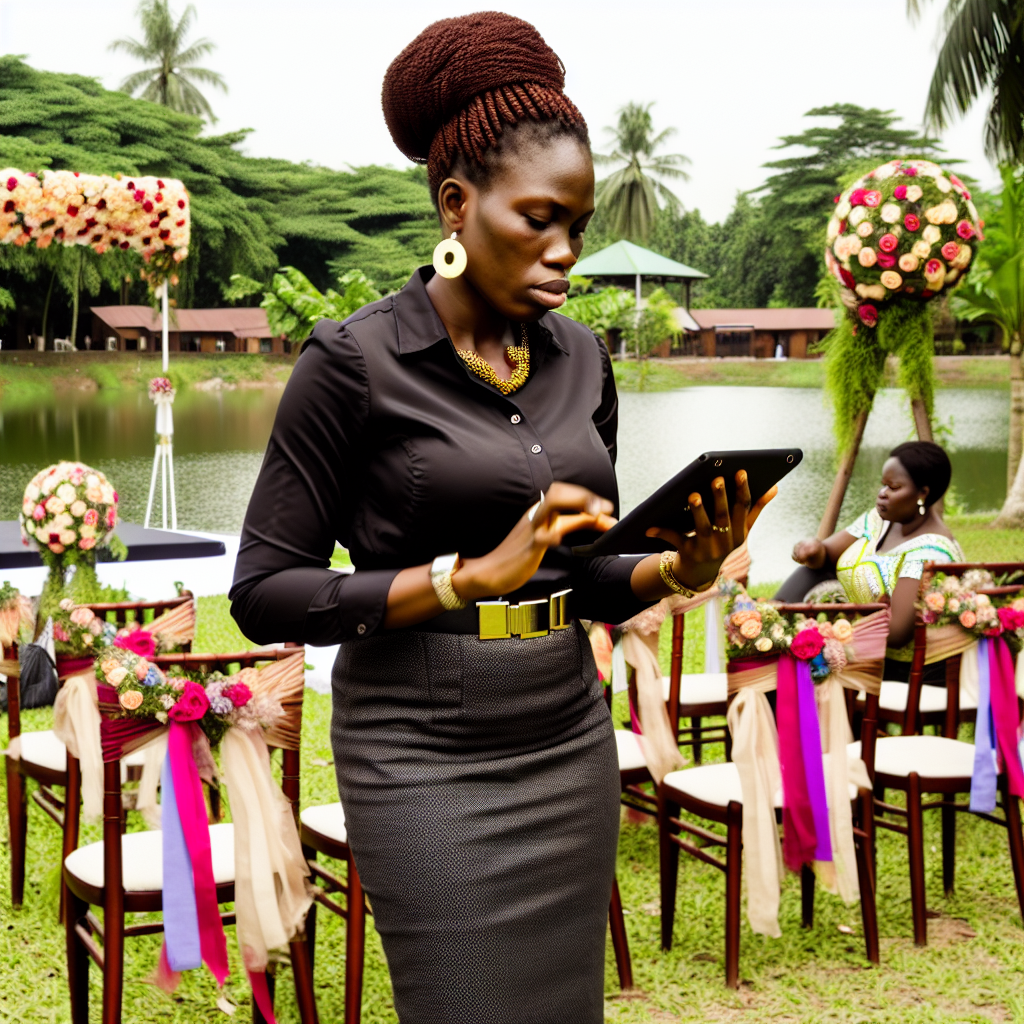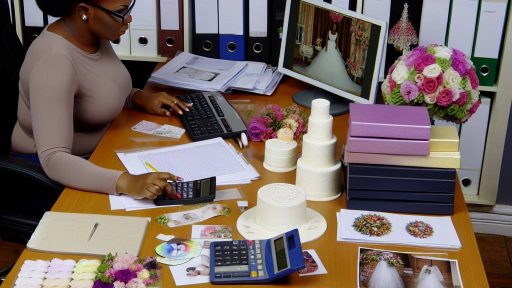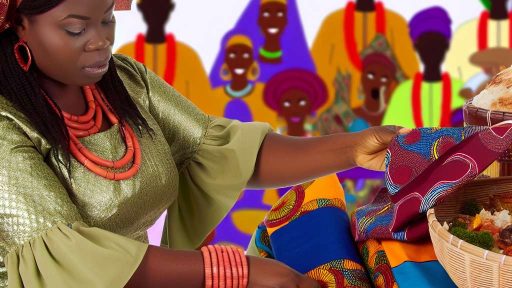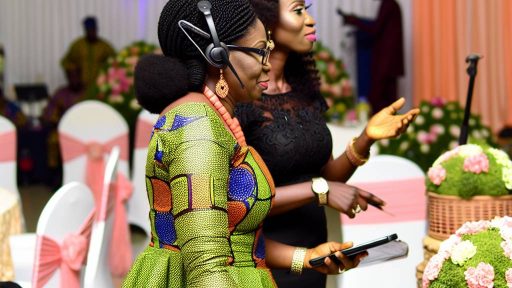Understanding Nigerian Wedding Traditions and Customs
Importance of Cultural Heritage
Nigerian weddings are rich in cultural heritage and traditions.
Each ethnic group has unique customs and rituals.
Understanding these traditions creates a more meaningful experience.
Furthermore, it honors the families involved in the union.
Pre-Wedding Rituals
Pre-wedding rituals vary among different tribes.
For instance, the Yoruba tradition includes a formal introduction ceremony.
This is known as ‘ila’ where families meet and discuss marriage intentions.
Additionally, the Igbo culture emphasizes the bride price negotiation.
Ceremonial Aspects
Nigerian weddings are often vibrant and colorful affairs.
Many couples incorporate traditional attire into their ceremonies.
For example, brides may wear beautifully embroidered gowns and gele head wraps.
Grooms often don outfits called agbada, highlighting their heritage.
Reception Festivities
The reception is a highlight of any Nigerian wedding.
It usually features lively music, dancing, and plenty of food.
Guests celebrate with traditional dishes like jollof rice and pounded yam.
Additionally, the wedding cake is often a multi-tiered masterpiece.
Role of Family and Community
Family and community play a crucial role in Nigerian weddings.
Extended family members often help with planning and preparation.
Moreover, community leaders may bless the couple during the ceremony.
This demonstrates both support and commitment from the families.
Significance of Traditions
Understanding these traditions enhances the wedding experience.
It fosters respect between families and cultural appreciation.
Ultimately, it creates lasting memories for all involved.
Setting a Realistic Wedding Budget
Understanding Your Financial Situation
Begin by assessing your current financial situation.
Consider all available resources, such as savings and support from family.
Data from the Nigerian Marriage Market indicates that a proper assessment is crucial.
Determining Overall Costs
Identify all potential expenses involved in the wedding.
Common expenses include venue, catering, attire, and decor.
Get estimates from local vendors to achieve accurate budgeting.
Breaking Down the Budget
Segment your budget into various categories.
- Venue and Catering
- Attire and Accessories
- Photography and Videography
- Decorations
- Entertainment
This approach allows you to see where to allocate more funds.
Setting a Maximum Limit
Decide on a total maximum budget for your wedding.
Ensure that this limit is realistic based on your assessments.
This setting will help to guide your spending decisions.
Creating a Contingency Fund
It’s wise to set aside additional funds for unexpected expenses.
Typically, a contingency fund of about 10% of your budget is recommended.
This fund will provide peace of mind as you plan.
Sticking to Your Budget
Track all expenses diligently to avoid overspending.
Use budgeting apps or spreadsheets to monitor your finances.
Additionally, regular check-ins can help keep you on track.
Seeking Professional Help
If budgeting feels overwhelming, consider hiring a wedding planner.
Professionals like Chidinma Celebrations can provide valuable expertise.
Furthermore, they often have established relationships with vendors.
Adjusting as Needed
Be flexible and willing to adjust your budget if necessary.
Prioritize essential elements while cutting costs on less important aspects.
Regularly revisit and revise your budget as you progress.
Choosing an Appropriate Wedding Date and Venue
Selecting the Wedding Date
Selecting the ideal wedding date requires careful consideration.
Begin by checking the calendars for your preferred month.
Consider the season and its impact on your wedding theme.
Take note of public holidays that could affect availability.
Seek advice from family and friends regarding suitable dates.
Consult your partner to agree on a date both of you cherish.
Finding the Perfect Venue
The venue sets the tone for your wedding.
Start by determining the number of guests you plan to invite.
Consider your budget when exploring venue options.
Research various venues that align with your style and theme.
Visit potential venues to assess their atmosphere and facilities.
Ensure that the venue’s location is convenient for guests.
Making Reservations and Confirmations
Once you’ve chosen a date and venue, secure the booking promptly.
It is advisable to sign a contract with the venue.
Confirm all details, including capacity and payment terms.
Inquire about cancellation policies for unexpected circumstances.
Finally, maintain open communication with venue management throughout the planning process.
Gain More Insights: How to Plan a Nigerian Wedding on a Budget Without Sacrificing Style
Creating a Comprehensive Guest List and Sending Invitations Early
Identifying Key Guests
Start by identifying essential family members and close friends.
Get Your Wedding Business Featured on MarriageInNigeria.ng
Build trust, show up on Google, and attract more clients with a done-for-you profile post.
Get Featured NowList important relatives from both the bride’s and groom’s sides.
Next, include close friends who have supported the couple.
Consider adding work colleagues and mentors who are significant.
Expanding the Guest List
After listing key guests, think about acquaintances and extended family.
Include friends of family members who should be invited.
Ensure to account for children if attending will impact numbers.
Remember to check with parents for additional names to consider.
Counting Guests
Once the list is complete, estimate the total number of guests.
This estimate helps in budgeting for the wedding.
Allocate appropriate seating based on relationships.
Sending Invitations Early
Send invitations at least two to three months before the wedding.
This allows guests ample time to RSVP and plan accordingly.
Utilize digital invitations for a more efficient process.
Managing RSVPs
Track responses using a spreadsheet or wedding planning app.
Follow up with guests who have not responded as the date approaches.
This ensures accurate headcounts for catering and seating arrangements.
Personalizing Invitations
Consider personalizing each invitation with names or notes.
A personal touch can make guests feel special and valued.
This gesture also encourages them to attend eagerly.
Finalizing the Guest List
Finalize the guest list three weeks before the wedding.
Confirm details with the venue and caterer based on final numbers.
This step is crucial for avoiding last-minute surprises.
You Might Also Like: The Essential Checklist for Planning a Stress-Free Nigerian Wedding
Selecting Reliable Vendors for Catering, Photography, and Decoration
Catering Services
Choosing the right catering service can make or break your wedding reception.
Start by gathering recommendations from friends and family.
Next, research online reviews of local caterers.
Shortlist caterers who specialize in Nigerian cuisine.
Request tasting sessions to evaluate their food quality.
Discuss menu options, dietary restrictions, and pricing clearly.
Finally, confirm their availability on your chosen date.
Photography Services
Your wedding photos will be cherished for years to come.
Begin by reviewing portfolios of various photographers.
Look for someone whose style resonates with your vision.
Schedule interviews to discuss your preferences and ideas.
Ask for a full wedding day coverage plan and pricing.
Ensure they have backup equipment for unforeseen issues.
Lastly, finalize the contract and payment terms in advance.
Decoration Services
A well-decorated venue sets the tone for your wedding celebration.
Identify your wedding theme and color scheme first.
Gather inspiration from wedding magazines and websites.
Contact decorators with experience in Nigerian wedding aesthetics.
Request quotes and discuss your specific decoration needs.
Schedule a meeting to visualize your ideas together.
Confirm the decorator’s availability and logistics for setup.
Delve into the Subject: Essential Nigerian Wedding Planning Tips for A Perfect Ceremony

Planning the Wedding Itinerary and Timeline of Events
Establishing the Timeline
Begin by setting a clear timeline for the wedding events.
Start this process at least six months before the wedding day.
Outline all major activities, such as the ceremony and reception.
By having a timeline, you can minimize last-minute stress.
Creating an Itinerary
Your wedding itinerary is crucial for staying organized.
Include guest arrivals, rehearsals, and the wedding ceremony.
Make sure to account for travel time between venues.
Distribute the finalized itinerary to all involved parties.
Coordinating with Vendors
Contact all vendors early in the planning process.
Discuss timelines and logistics with each vendor.
Communicate any changes promptly to avoid confusion.
This coordination ensures everyone is on the same page.
Designating Roles
Assign clear roles to family and friends helping with the wedding.
Delegation will ease the burden of planning and execution.
Ensure everyone knows their responsibilities on the wedding day.
This will create a more efficient workflow during the event.
Finalizing Details
As the wedding date approaches, confirm all arrangements.
Touch base with vendors a week before the event.
Double-check the timeline and adjust as necessary.
These small steps will help reduce anxiety on the big day.
Get Your Wedding Business Featured on MarriageInNigeria.ng
Build trust, show up on Google, and attract more clients with a done-for-you profile post.
Get Featured NowDelve into the Subject: Your Ultimate Guide to Planning a Nigerian Wedding
Incorporating Cultural Elements and Personal Touches into the Ceremony
Understanding Nigerian Wedding Traditions
Nigerian weddings are vibrant and culturally rich events.
Each ethnic group boasts its unique traditions and customs.
Understanding these traditions is essential for meaningful celebrations.
Choosing Cultural Attire
Traditional attire plays a significant role in Nigerian weddings.
Brides often wear beautiful, colorful gowns made from local fabrics.
Grooms typically don traditional outfits that reflect their heritage.
Consider mixing traditional and contemporary styles for flair.
Incorporating Rituals and Ceremonies
Many Nigerian weddings include unique rituals that symbolize unity.
The exchange of gifts, among families, showcases mutual respect.
Take time to select rituals that resonate with both families.
Additionally, consider integrating both Christian and traditional ceremonies.
Personalizing the Ceremony
Include personal elements to make the ceremony unforgettable.
Custom vows can express individual feelings and commitment.
Choosing a meaningful venue enhances the overall experience.
Incorporate favorite songs or poems for a personal touch.
Creating a Signature Experience
Design unique experiences that reflect the couple’s story.
Customized decorations can capture shared memories effectively.
Consider signature cocktails that represent the couple’s preferences.
Engage local musicians for an authentic vibe during the ceremony.
Engaging Family and Friends
Involve family and friends in planning significant aspects.
This creates a sense of community and shared joy.
Consider assigning roles to close friends for a personal connection.
Incorporating traditions from both families fosters unity.
Documenting Cultural Significance
Make an effort to document the cultural significance of your wedding.
Provide guests with information on the traditions being practiced.
Consider having a cultural ambassador to explain various elements.
This expands awareness and appreciation among guests.
Ensuring Legal Requirements and Documentation are in Order
Understanding Marriage Registration
Begin by familiarizing yourself with marriage registration laws in Nigeria.
This process varies from state to state, so do your research.
Typically, couples must register at the local marriage registry.
Gather the necessary documents to facilitate this process.
Collecting Required Documents
The following documents are usually required for registration:
- Valid identification (e.g., National ID, Passport).
- Birth certificates of both parties.
- Affidavit of single status.
- Passport photographs of both parties.
Ensure all documents are current and in good condition.
Obtaining Parental Consent
Gather any required parental consents, especially if you are underage.
This consent should be formal and preferably in writing.
Consult with both families regarding their expectations and requirements.
Choosing the Right Venue
Select a venue that meets the legal requirements for marriage ceremonies.
Check if you need to apply for special permits for certain venues.
Consider both religious and civil venues for your ceremony.
Processing the Marriage License
Submit your completed marriage application form along with the collected documents.
Pay any required fees promptly to avoid delays.
Typically, there is a waiting period before the license is issued.
Confirming Appointments and Dates
Once your license is ready, schedule your wedding date.
Confirm all appointments with your chosen officiant or registrar.
Ensure that both you and your partner are available for the ceremony.
Understanding Cultural Requirements
Be aware of cultural traditions that may impact your registration.
Some ethnic groups have specific requirements for marriage documentation.
Discuss these requirements openly with your partner and families.
Additional Resources
Real Talk: Wedding Planning Should Be Fun
Need advice on how to have a Nigerian wedding as a socially …




